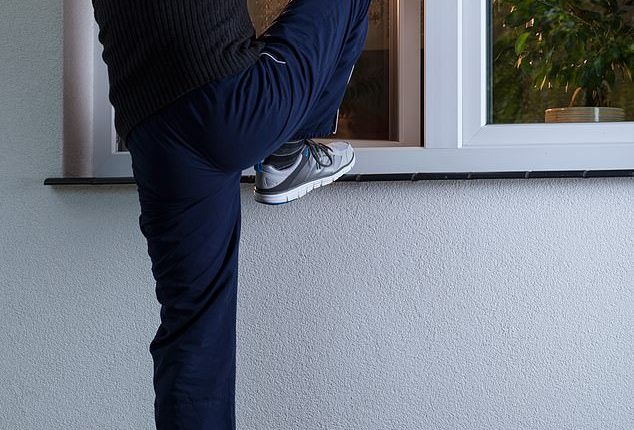- Leaflet advocating the planting of pokey shrubs is given out in the capital
- Critics dismiss the move as ‘gardening advice’ – but it is promoted across the UK
Worried about getting broken into? The Metropolitan Police has some pointed advice: plant some spiky hedges.
Britain’s biggest police force has earned the ire of Conservative critics after it began redistributing a leaflet on creating ‘natural defences’ against home invaders to victims of break-ins in London, according to reports.
Entitled ‘Protect your home from burglars by protecting your garden’, the leaflet advises planting one of a number of types of shrubs in mature or semi-mature form.
The shrubs can, the Met suggests, ‘make it harder for burglars to access your property or put them off completely’ – and are most effective when planted close together.
Among the shrubs suggested are berberis and hawthorns, both of which have sharp spines, as well as firethorn and chaenomeles, also known as quince.
Others like holly and mahonia are recommended because of their spiky leaves – all of which could make a burglar think twice about trying to leap through a window.
‘Planting particular shrubs (in their mature or semi mature form) along garden walls and fences can make it harder for burglars to access your property or put them off completely,’ the leaflet says. ‘To maximise this effect plant them close to each other.’
Chris Philp, the shadow home secretary, claimed the Met had better things to do than engage in ‘gardening advice’.

The Met Police has recommended to victims of break-ins that they should place shrubberies in their gardens to deter burglars (stock photo)

An earlier version of the leaflet believed to have been given to London break-in victims by the Metropolitan Police, which lists recommended varieties of shrub to plant

Shadow home secretary Chris Philp has criticised the Met for giving out what he called ‘gardening advice’, despite the advice being adopted by several police forces across the UK
‘For all crime the Met’s clear-up rate is the worst in the country,’ he told The Times.
‘The Met Police needs to concentrate on the basics of catching criminals and less on gardening advice.
‘The police’s most basic function is catching criminals and a 5 per cent charge rate is just not good enough.
‘I want to see the police using more effective methods such as facial recognition to catch criminals and put them where they belong, in prison. Gardening advice is not going to help do that.’
Several versions of the pamphlet have been distributed among community groups recent years.
And it appears to be based on general advice supplied by several police forces across the UK.
Similar advice on shrubs appears on the websites of Sussex, Thames Valley and Kent police forces, as well as in North Yorkshire.
Other advice includes keeping hedges low to stop burglars from hiding out of sight, locking side gates at all times and planting ‘prickly plants’ like those mentioned to make it harder for burglars to get in.
A total of 54,282 burglaries were reported to the Met between January and December 2024 – down 4.3 per cent year-on-year.

Varieties of shrub such as barberry (pictured) have notably spiky thorns that could put prospective burglars off
Around 3,000 ‘positive outcomes’, meaning actions resulting in action such as a criminal charge or arrest, were recorded in the same time period.
This came after the Met pledged to attend every possible report of burglary after commissioner Sir Mark Rowley criticised local officers’ low attendance rates at break-ins.
A Met spokesperson told the newspaper: ‘Advice such as this adds to the hard work of officers to target the most prolific offenders, which has resulted in a 10 per cent reduction in the number of residential burglaries reported across London over the past year.
‘We will continue to help prevent people from becoming victims while simultaneously cracking down on burglars and organised crime groups.’









